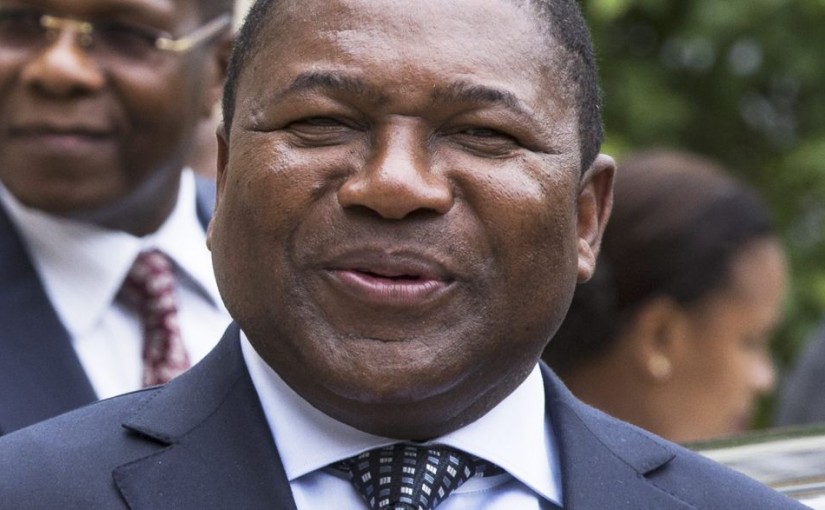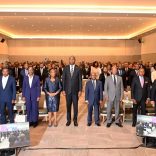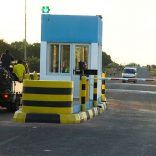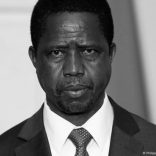Mozambique: President makes new appointments, promotions in the FADM
President Nyusi in Manica province for three-day working visit – Mozambique

File photo / Filipe Jacinto Nyusi, president of Mozambique
President Nyusi starts today, August 12, a three day working visit to Manica province where he will visit Mossurize, Macossa, Macate and Vanduzi districts, and anticipation surrounding the event is huge, Notícias reports.
The Manica provincial government cited by Notícias has announced that the President will hold rallies in the headquarters of the four districts, visit and carry out inaugurations of economic and social developments and to meet local government officials to measure the popular pulse and compliance with targets set for the previous and the present financial year.
On his arrival in Espungabera today, the head of state will celebrate with a popular rally in the district village headquarters, inaugurate a new water supply system and direct a special session of the Manica provincial government, at which Governor Alberto Mondlane will present a comprehensive report on the various aspects of political, economic and social life of the province.
The president will then go on to and Vanduzi districts, where he will guide rallies, visit fairs of farm and craft products and the Vanduzi company’s farms and agro-processing factory, plant trees and inaugurate the new Macossa district offices. The Vanduzi Company produces many agricultural products, including baby corn, chilli and vegetables, and exports to Europe, especially the UK.
In Macate District, the last stage of his presidential visit, the head of state will visit Zembe, the Westfállia company focused on the production and export of avocado and litchi to Europe and Asia, before inaugurating a new secondary school in the district headquarters.
In terms of preparations for the presidential visit, source of Manica provincial government assured that everything is ready for the reception of the head of state. Our reporter notes that all the sites on the presidential agenda are decorated with banners and other propaganda materials extolling the figure and the works of Filipe Nyusi.
Rich province
Located in the central region of the country, Manica has a huge potential in agriculture and livestock production which, in addition to domestic consumption, contributes substantially to exports. Manica is a favoured destination for many important domestic and foreign companies, occupying a prominent place in the production of cereals, vegetables, fruits and other food and non-food crops, including soybean, sunflower, sesame, wheat, tobacco and cotton.
Signs of Manica’s growth are everywhere. In all sectors, progress reflects the high human development rates that the province is experiencing, and, on anecdotal evidence, poverty in this province is, little by little, receding.
Changes in the transport sector, the construction of roads and the enterprises that are being established throughout the province, indicate the great efforts that are being made to combat poverty, with a significantly lower number of families living in absolutely poverty.
With over 1.6 million inhabitants and with an area of 61,661 square kilometres, Manica has potential in the agro-livestock production, which is gradually reducing poverty rates, although, paradoxically, chronic malnutrition prevails in a province producing a variety of foods.
Peace and security: main longing
Despite the successes being achieved in several areas, huge challenges still face the government of Manica. The lack of peace and security remains a major impediment to the collective goal of provincial development.
Attacks by armed Renamo men who kill and injure innocent people and destroy public and private property, including means of transport belonging to nationals and foreign individuals, means depending on military escorts to access, for example, the districts of Báruè, Guro, Macossa and Tambara.
As a result of this, and the global economic environment, the cost of living has increased at provincial level, where basic necessities (especially food) prices have doubled in the last six months, posing serious challenges for families already suffering the effects of the drought affecting Macossa, Guro, Tambara, Machaze and parts of Mossurize.
Therefore, the people meeting the head of state will assert the urgent need to restore peace to Mozambique, doing everything possible to end the military tension that has developed and which continues to tear the country apart with deaths, injuries and destruction putting local people in a state of panic, despair and widespread insecurity.
The current political scenario affects the national economy negatively and Manica province in particular, with the high cost of living the visible face of the situation. The price of basic goods, both food and non-food, has doubled, and, when added to general inflation and the effects of drought, has left thousands of people facing food shortages.
In addition, most of the population of the province do not have access to safe drinking water, particularly in rural areas where a considerable portion of the drinking water is extracted in traditional wells without pumps. Many continue to consume water from rivers, ponds and lakes, while 15.6 percent of the population benefits from the water from public standpipes.
Unemployment, which mostly affects young people, is another challenge. The Manica government has intervened with programs such as the District Development Fund (FDD) and the Fund to Combat Urban Poverty (FERPU) and youth empowerment initiatives led by the youth and sports sector.
The FDD has been considered an important leverage to family budgets and national income distribution, and thousands of food production, income generation and job creation projects and other services are being implemented.
Against this backdrop, the governor of Manica says that the prevailing problems resulting from the global environment, poverty and political tension are the challenge to face, adding that everything is being done to minimize the levels of poverty in the province, preserve peace and national unity and ensure sound and harmonious coexistence among Mozambicans.
On the government’s performance and behaviour of human development statistics, Mondlane says that he takes pride in knowing that the quality of life of the population of the province has improved year after year, appealing to all for a unified front against poverty and reducing the negative impact of this phenomenon on the human and social development of the province.
According to the governor, despite the constraints and threats to peace that have Renamo perpetrates, the province is taking significant steps, with visible signs of progress in various fields, thanks to the combined effort of the population, economic agents and government authorities at various levels.
Notícias took to the streets to sample popular opinion on the president’s visit, and heard that it is of paramount importance to focus on peace, which is regarded as essential for development and the political stability, macro-economic and social development of the country and of Manica in particular.
Our respondents argued that peace should be placed above all other priorities in the president’s speech, because they consider that it is the beginning and the end of everything.

“We work a lot, talk a lot and draw up many brilliant projects and ambitious plans for economic and social development, but without peace all this will be a dead letter. Nothing can flourish in a war environment and under the roar of the guns,” said Eugenio Manuel, a driver on the Chimoio-Guro route.
For Manuel, a combination of factors disturbs Mozambicans, but the most important is military tension. If the global economic situation has a disastrous influence on the economy, what about the adverse effects of the military conflict that kills, injures, destroys, creates panic, instability and prevents the free movement of people and goods, particularly goods, he asks.
In his view, the war is more dangerous than poverty.
“We cannot recover our economy and again shine in the concert of nations unless we end the differences that divide us and drive us to war. If Mozambicans do not restore peace and mutual respect, and above all respect for life and human dignity, nothing will be left for them but to continue sinking,” he said.
So Manuel and other respondents are of the opinion that the government, and especially the president, should step up efforts to put an end to the military hostilities that continue to claim lives and destroy the national economy.
“We want a cessation of hostilities as soon as possible, and Renamo leader Afonso Dhlakama out of the woods and joining all those who, day and night, are working for developing the country,” he says.
Avoid spilling blood
The shedding of innocent blood should be avoided by any self-respecting politician in the struggle for power, entrepreneur Joaquim Hilário says, arguing that a ruler cannot serve the people while killing the same people he or she serves.
“When Renamo kills civilians, innocent people, what message does it convey to the people of Mozambique? Is it fighting the system or terrorizing the population that voted [for Renamo] in the provinces where it claims to have won the election?” he asked.
Hilário said it was paradoxical that Renamo has concentrated its military incursions and killing people in the provinces where it demands to rule, and therefore considers the cessation of military hostilities imperative.
“This is our biggest concern. The head of state should be tireless ion persuading Afonso Dhlakama to abandon terrorism. The goal of this agenda should be the end of the conflict and the full reconciliation of Mozambicans,” he says, adding that his business is declining as a result of the devaluation of the metical.
Hilário said that dialogue will need to be frank, open and objective if it is to overcome the differences between the parties and re-establish an effective and lasting peace in the country.













Leave a Reply
Be the First to Comment!
You must be logged in to post a comment.
You must be logged in to post a comment.